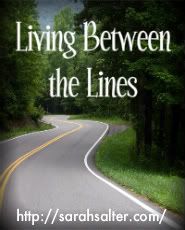|
Before
I knew the difference between Christian fiction and mainstream fiction,
before I knew anything about genre or fiction craft, my brother came
home with Frank Peretti’s novel This Present Darkness.
I had never read anything that vivid or dynamic before. I loved every
page of it and have since devoured anything and everything with Frank
Peretti’s name on it.
I’ve never been a big fan of
horror movies. I’ve watched very few of them and have read even fewer
thrillers. I find violence and brutality to be innately gratuitous and
needless. But then a new Frank Peretti novel was released, a thriller
called House. He had cowritten it with Ted Dekker.
I had heard of Dekker—heard good things, in fact. There was no question
about it. I had to read it.
I purchased House
in hardback one evening soon after its release. I came home, headed
upstairs to my bedroom, and spent about six of the most terrifying
hours of my life reading it from cover to cover. It made my stomach
turn, my skin crawl, my hair stand up, and my heart race. In a word, it
was awesome!
Jack and Stephanie Singleton are
on the road to divorce, but driving to one last counseling session they
find themselves lost in the middle of nowhere in the backwoods of
Alabama. They think things can’t possibly get any worse when they get
pulled over by the strangest and crankiest cop ever. But when they
follow his directions and end up stranded at a deserted inn because
their car was sabotaged, they begin to wonder what kind of nightmare
they’ve really stumbled into.
At the Wayside Inn, Jack and
Stephanie meet another unfortunate pair, Leslie Taylor and her
boyfriend, Randy Messarue. The four quickly learn that they aren’t
guests at this house but prisoners. And the madman holding them
prisoner gives them a set of chilling house rules:
1. God
came to my house and I killed him.
2. I will kill anyone who comes to my house the way I killed God.
3. Give me one dead body and I might let Rule #2 slide.
The four houseguests find
themselves trapped in an evil house, hunted by its demonic inhabitants,
and threatened by a brilliant but ruthless mastermind who seems to know
everything about them—especially their weaknesses. And they have only
until dawn to find a way out of the madness.
For
my first thriller, it was a scary book, but it was also good. The
longer I read, the more lights I had to turn on in my apartment. But I
also became more and more invested in the characters and the story. I
couldn’t put the book down.
Because I’ve never been a scary
movie fan (and because I was a little scared to watch it alone), I
recruited my brother to watch the movie with me. As a
horror/thriller/sci-fi/fantasy fanatic, he was the perfect sounding
board for my opinions. He had also read the novel, though it had been a
while. We turned out all the living room lights and popped in the DVD.
My
first impression of the movie
was that it was absolutely as suspenseful as the book. My second was
that although the screenwriter made some unexpected and probably
unnecessary changes to the characters’ backstories, I think they did an
admirable job of developing the characters.
|
My
brother kept quiet the whole
movie, but as soon as the ending credits began to roll, his voice rang
out in the darkness: “That was the best adaptation of a thriller I’ve
ever seen.” I have to say that I agree, but at the same time, it’s the
only adaptation of a thriller I’ve ever seen.
I was thoroughly impressed with
the movie version of House, except for one thing,
the most important factor: The Christian message that was central to
the novel was not central to the movie. For viewers who are simply
looking for a good scary movie or an enjoyable psychological thriller,
it’s definitely a worthwhile investment. But for a Christian movie
connoisseur who is looking for a movie that’s true to the Christian
message, this movie just doesn’t hold up.
In the novel, the pivotal truth
is John 1:5: “The light came into the darkness, and the darkness did
not understand it” (NIV, paraphrase). Throughout the book, the
characters are being forced to face and deal with their sins and the
subsequent consequences. However, the movie never confronts sin or
truth. It refers to sin, but the examples given are questionable; it
doesn’t make it clear that repentance is an option, and it doesn’t
address forgiveness as possible. Also, when the movie makes the
occasional vague reference to “the light,” it does not seem to be
Christ to whom they are referring. To a viewer who hasn’t read the
book, the ambiguous and vague references to “light” and “truth” could
make the movie seem more New Age than Christian.
The greatest strength of the
novel is the gospel truth that is lived out through the characters. The
plot and the characters are strong and complex, thought-provoking, and
at times almost confusing. But when you focus on the John 1:5 message
and use it as a filter for the story, the story contains a powerful
truth: The wages of sin is death, but when you step into the light of
Christ, there is life.
For a recreational movie watcher
just interested in a good thriller, this is a movie worth watching.
However, when choosing between the novel and the movie, the novel gets
my vote both for entertainment value and for successfully portraying a
clear and personal gospel message.

|